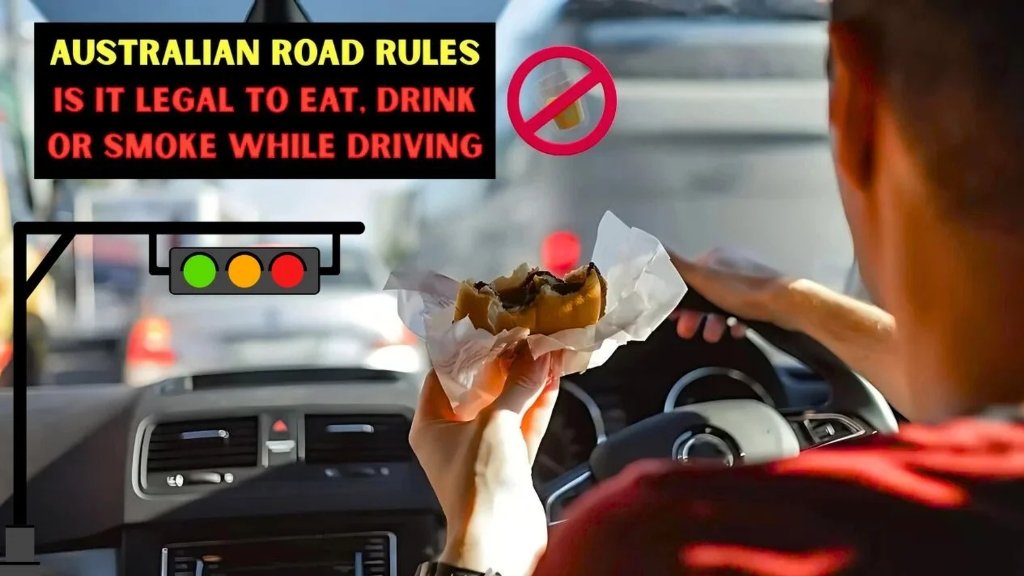A major change to traffic laws is being warned to the Australian drivers, whereby new penalties are directed at the distractions during driving. New laws may see drivers caught eating, drinking or vaping behind the wheel, subjecting them to a penalty of up to $1,500 and a few demerit points. The authority claims that the move will help to minimize accidents due to lapses in concentration, which in split seconds.
Penalty Enforcement Timeline:
| State/Territory | Start Date | Enforcement Method |
|---|---|---|
| NSW | Oct 2025 | Police patrols & cameras |
| QLD | Nov 2025 | Roadside surveillance |
| VIC | Oct 2025 | Fixed & mobile cameras |
A breach may also be in the form of even holding food, drinking a drink, or even vaping because it influences driving performance or vehicle control. These behaviours may appear to be innocent but have since been termed as risky distractions and hence are in tandem with tighter road safety campaigns in the country.

The cause of the crackdown was as follows.
According to state transport authorities, distracted driving is an increasingly common cause of the incidents on the road that is underestimated in comparison with speeding or cell phone use. Research has indicated that even simple distractions such as eating or drinking, slow down reaction times and diminish awareness of road risks. Vaping has been incorporated into the new fine structure, and this is because a lot of concern has been raised over drivers not having their hands on the wheel. Police also threaten that they will be enforced on the spot, as well as by telephone using increased cameras. This implies that drivers do not have to be swerving or causing an accident to receive the penalty but only being caught committing such acts is sufficient.
Fine and Points Overview:
| Offence | Maximum Fine | Demerit Points |
|---|---|---|
| Eating while driving | $1,500 | 3–4 points |
| Drinking (non-alcoholic) while driving | $1,500 | 3–4 points |
| Vaping while driving | $1,500 | 4 points |
It is important to note that the reaction and concerns exhibited by the populace are often hard to recognize. It should be mentioned that the reaction and concerns expressed by the population are usually difficult to identify.
Although road safety activists have praised the change, there have been concerns about the practicality by some motorists. Critics complain that this will unfairly penalize drivers who have a moment to gulp some water on a hot day or have a quick bite on long journeys where there is a lack of rest stops. Nonetheless, authorities emphasize that attention is paid to the prevention of risky behaviour, which distracts the driving process.
They also facilitate the use of rest areas among motorists and take breaks during travels. According to insurance professionals, recurring violations would go further to affect the premiums hence the need to maintain compliance. The government is also carrying out public awareness campaigns through radio and social media and roadside billboards so that the drivers are aware of the rules before strict enforcement of the laws is done.
How to Be Safe and Not to Pay Fines.
It is recommended that drivers should always exercise total control of the car and not multitask when using the road. These include holding your hands free to steer and avoid doing anything as a distraction to driving. The law enforcers recommend carrying snacks and beverages to be used during the rest stops as opposed to taking them on the go. People are not supposed to vape in the car unless they are parked in a safe place. The transport departments are hoping that these modifications will help in making more responsible drivers and eventually cut down the levels of accidents. With penalties posing as serious as high-range speeding offences, the message is easy to get across; safety first and no distractions.
FAQs
1. Could I now drink water in Australia when driving?
Yes, however, when it affects your control or distracts you, you can be fined.
2. Does passengers vaping attract a fine?
No, this rule covers drivers who are in charge of the vehicle.
3. Are these fines nationwide?
Yes but, depending on the state, start dates and enforcement methods differ.



